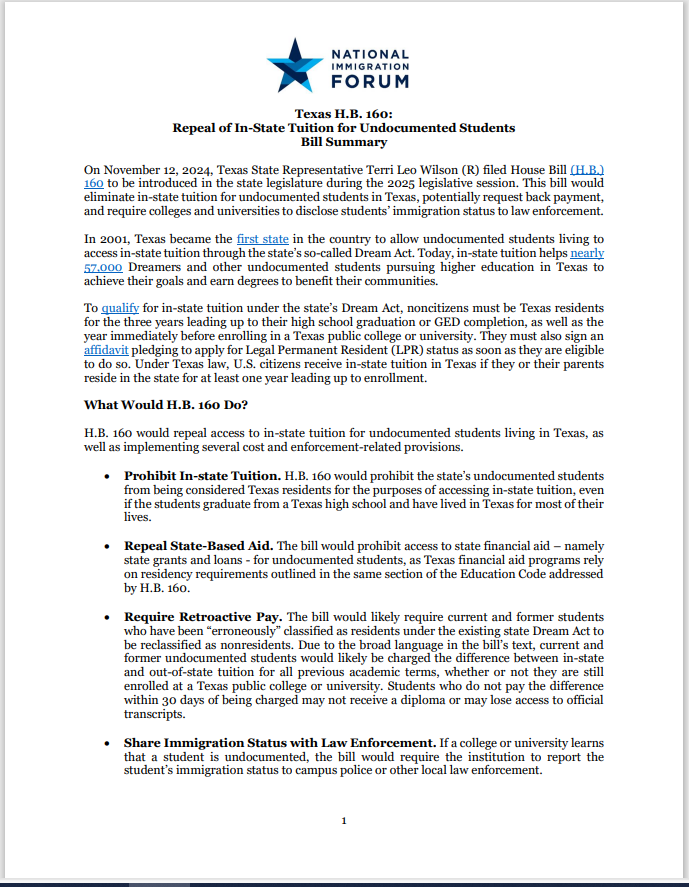
On November 12, 2024, Texas State Representative Terri Leo Wilson (R) filed House Bill (H.B.) 160 to be introduced in the state legislature during the 2025 legislative session. This bill would eliminate in-state tuition for undocumented students in Texas, potentially request back payment, and require colleges and universities to disclose students’ immigration status to law enforcement.
In 2001, Texas became the first state in the country to allow undocumented students living to access in-state tuition through the state’s so-called Dream Act. Today, in-state tuition helps nearly 57,000 Dreamers and other undocumented students pursuing higher education in Texas to achieve their goals and earn degrees to benefit their communities.
To qualify for in-state tuition under the state’s Dream Act, noncitizens must be Texas residents for the three years leading up to their high school graduation or GED completion, as well as the year immediately before enrolling in a Texas public college or university. They must also sign an affidavit pledging to apply for Legal Permanent Resident (LPR) status as soon as they are eligible to do so. Under Texas law, U.S. citizens receive in-state tuition in Texas if they or their parents reside in the state for at least one year leading up to enrollment.
What Would H.B. 160 Do?
H.B. 160 would repeal access to in-state tuition for undocumented students living in Texas, as well as implementing several cost and enforcement-related provisions.
- Prohibit In-state Tuition. H.B. 160 would prohibit the state’s undocumented students from being considered Texas residents for the purposes of accessing in-state tuition, even if the students graduate from a Texas high school and have lived in Texas for most of their lives.
- Repeal State-Based Aid. The bill would prohibit access to state financial aid – namely state grants and loans – for undocumented students, as Texas financial aid programs rely on residency requirements outlined in the same section of the Education Code addressed by H.B. 160.
- Require Retroactive Pay. The bill would likely require current and former students who have been “erroneously” classified as residents under the existing state Dream Act to be reclassified as nonresidents. Due to the broad language in the bill’s text, current and former undocumented students would likely be charged the difference between in-state and out-of-state tuition for all previous academic terms, whether or not they are still enrolled at a Texas public college or university. Students who do not pay the difference within 30 days of being charged may not receive a diploma or may lose access to official transcripts.
- Share Immigration Status with Law Enforcement. If a college or university learns that a student is undocumented, the bill would require the institution to report the student’s immigration status to campus police or other local law enforcement.
- Exclude Undocumented Students from Special Rates at Certain Universities. Higher education institutions located near Texas’s border with other states can request to set a lower out-of-state tuition rate than the rate prescribed by the Texas Higher Education Coordinating Board. However, this bill would prohibit undocumented students from accessing these lower rates at qualifying schools; they would still be charged full out-of-state tuition.
If H.B. 160 were to receive the vote of two-thirds of all Texas state legislators, it would take immediate effect. If it passed without a two-thirds majority, it would take effect on September 1, 2025.
H.B. 160’s Impact on Dreamers and their Communities
H.B. 160 would create significant obstacles for Dreamers and other undocumented students to access higher education, support themselves and their families, and put their degrees to work in Texas communities.
- Significant Cost. Texas out-of-state tuition is roughly three times the rate of in-state tuition. If H.B. 160 is implemented, current and former students – including those who have already completed several academic terms – could face significant costs going forward and unexpected, substantial charges for past school terms. These charges could add up to tens of thousands of dollars to be paid within 30 days, or risk not receiving their diploma and losing access to transcripts. The out-of-pocket cost of higher education would place it beyond reach for many undocumented students in Texas.
- Notification to Law Enforcement. Requiring colleges to notify law enforcement when they learn of an undocumented student’s status could have profound ramifications for undocumented students and their communities. This policy might increase fear and stress among these students, many of whom would be afraid to enroll in an institution of higher education due to the possible threat of deportation. Undocumented students could feel a heightened need to forego higher education or hide their immigration status from others on campus, including their peers, professors, and school administration. To avoid being reported, students might not take advantage of school resources — like counseling, support services, on-campus housing, or student groups — or seek assistance from school officials.
- Economic Impact. Economic analysis suggests that rescinding in-state tuition for undocumented students in Texas could cost the state more than $461 million each year due to lost wages earnings and spending power. Undocumented Texans with bachelor’s degrees earn 57 percent more than those without, paying more in taxes and generating economic activity. Those with some college education, even if they do not complete their degree, create $46.4 million in economic activity in Texas annually. In 2022, undocumented Texans paid $4.9 billion in state and local taxes—a sum that helps support public higher education. Higher education also helps undocumented residents and other noncitizens contribute to industries with critical needs and labor shortages in the state. H.B. 160 would create significant barriers to undocumented residents who contribute to the state tax base and work in key professions.
.


